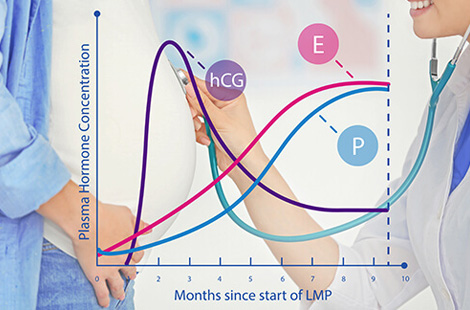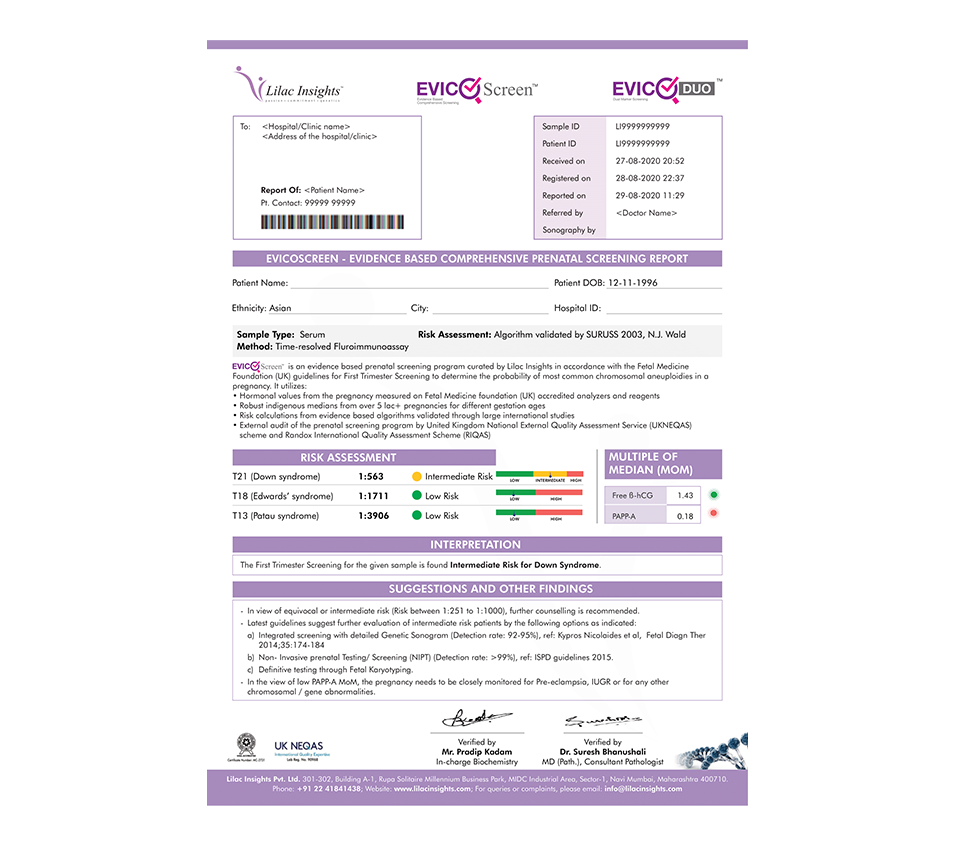Lilac Insights



Prenatal screening is offered to expecting parents to be able to provide information about whether their fetus/unborn baby might have certain genetic disorders or not. Prenatal screening can tell you the chances of your fetus having chromosomal abnormality or aneuploidies and a few other genetic disorders. In most developed countries, it is a routine practice to provide a pregnant woman her personalized risk for fetal aneuploidies (screening).
It is recognized that prenatal screening tests have a variable potential to detect chromosomal abnormality in first & second trimester screening program itself. It can screen for Trisomy 21, Trisomy 18, Trisomy 13, pregnancy complications such as preeclampsia and other adverse pregnancy outcomes.
Down syndrome (Trisomy 21) is the most common significant chromosome number abnormality; prenatal screening has emphasized the detection of Trisomy 21. Potential follow up options for women who are identified as being at high risk for prenatal disorder based on any of the screening test can include further counseling, additional testing and appropriate follow-up obstetric (pregnancy care).

EVICOScreen prenatal screening reports offer more information about the pregnancy compared to traditional reports.
Prenatal screening is advanced genetic screenings conducted on pregnant woman’s blood samples (maternal) that can help identify women whose pregnancies have a high risk of carrying an unborn child with some common chromosomal abnormalities. Screening is the first step & this identification helps determine the further course of action for doctors as well as the prospective parents.
Chromosomal abnormalities like Down syndrome, Edward’s syndrome and Patau syndrome are screened in prenatal screening. Besides these abnormalities prenatal screening also gives risks for certain non-chromosomal abnormalities like Pregnancy induced hypertension (Pre-eclampsia) & Open Neural Tube Defects.
Prenatal screening reveals a risk assessment which could be High risk (>1:250), Intermediate risk (1:250 to 1:1000) or Low risk (<1:1000) depending on the different parameters of analysis.
If a prenatal screening result comes back as high risk, the second step is to go for what are known as Confirmatory Tests after consulting with your doctor & prenatal genetic counselor. Confirmatory prenatal diagnosis involves analysis of amniocytes or chorionic villus to determine whether the fetus is affected with the chromosomal abnormality or not. Hence, it is important to offer conclusive diagnosis through amniocentesis or chorionic villus if the risk is high. These tests confirm if the fetus is indeed affected by a genetic abnormality which is reflected in previous prenatal screening test. No clinical decisions should be solely based on any screening results unless the diagnosis has been ascertained.
Intermediate risk report implies that due to some parameters, the pregnancy can not be identified as a clear low risk or high risk for having either of the most common chromosomal aneuploidies screened by the test. Further tests like Non-Invasive Prenatal Screening (InsighT/ InsighT-Adv/ InsighT Plus) or Integrated quadruple screening (done in the second trimester) or invasive procedure (like amniocentesis or CVS) followed by definitive tests or specialized sonography scan is recommended. Clinical geneticist certified genetic counselor, or your doctor can help you understand these personalized results and their implications in detail.
No clinical decisions should be solely based on any screening results unless the diagnosis has been ascertained.
Low-risk result implies that the pregnancy is at low risk of being affected with the most common chromosomal abnormalities screened by that test. However, it does not completely exclude the possibility of the pregnancy being affected by these abnormalities. As the test is a ‘risk assessment’ & not a confirmation, a residual chance of fetus being affected still exists. Your doctor would recommend the routine sonography scans and any other tests (if required) which are necessary for effective monitoring of your pregnancy.
If you are still unsure, you may contact your doctor or clinical geneticist or certified genetic counselor to understand these personalized results and their implications in detail.
No clinical decisions should be solely based on any screening results unless the diagnosis has been ascertained.
Confirmatory tests for checking chromosomal abnormalities carry a risk of miscarriage or harm to unborn baby, thus these confirmatory tests are commonly termed as Invasive procedure. Prenatal Screenings help identify those pregnancies that are at a high risk of having a chromosomal abnormality and therefore need an invasive test. Those pregnancies that reveal a low risk after a screening need not expose their pregnancy to undue harm by doing an invasive test.
Every pregnant woman should opt for a prenatal screening during her pregnancy, in order to give her personalized pregnancy risk and to make a decision whether she needs to undergo a diagnostic test to rule out randomly occurring common chromosomal abnormalities.
Since genetic diseases can either be passed on from a parent to child (in any pregnancy) or occur spontaneously during conception without any previous family history. Thus, it is recommended by various International Medical & Gynecological societies that prenatal screenings should be offered to all pregnant women.
Prenatal screening first and foremost gives expecting parent’s Peace of Mind by providing information of the health of their child much in advance.
Secondly & more importantly, because not all genetic disorders are treatable, screenings give parents the choice & freedom to make informed decisions in their pregnancy & the future of their loved ones. Also, opting for a Prenatal Screening will enable you to decide for or against an invasive confirmatory test.
Choice of a screening test can be done based on multiple factors like the period of pregnancy you are in (gestation age). Your doctor will be your best guide in helping you to choose the screening test best for you.
The different types are:
Regular blood drawn from the veins of the pregnant woman, technically referred to as peripheral blood is the sample required for prenatal screening
Unfortunately, genetic disorders cannot be screened beyond the given time frames. Conducting tests outside the screening windows would not be beneficial.
You should be screened for the most common & widespread disorders which the test already does. In addition, if there is any family history then you will require additional tests specific to those disorders which your consulting doctor will decide.
For prenatal screening the only requirement is to have an ongoing pregnancy. If you have multiple gestational pregnancies, like twins or triplets, the screening modality will differ; you can speak to your doctor for additional queries.
Normally one screening is all that is required. In some cases, especially for intermediate or high risk results, doctors & patients might decide for an additional screening option.
For the fetus & the mother, there are no risks associated with prenatal screening.
A trained phlebotomist or a nursing staff can draw the sample for the screening test.
Genetic testing & diagnoses differs from ordinary pathology test in several ways, mainly that medical genetics is a separate vertical within the field of medical sciences. The qualifications, background, expertise & technologies required to conduct & understand these tests are different from ordinary pathology test. Importantly, the resultant reports are also not simple computer outputs & require human intervention for interpretation. The screenings involve a complex process of measuring the levels, studying the patient demographics, correlating with ultrasound measurements and generating risk estimates for each pregnancy by diligently integrating all of the above.
There are international guidelines published on how prenatal screening should be performed in order to achieve the required detection rate for the risk assessment reported by the Fetal Medicine Foundation, UK.
Specialized Genetic Health Assessment & Diagnostic Centers like Lilac Insights should conduct prenatal screening because it is not a routine blood test. Genetic screenings need well equipped technical labs and analytical support staff to perform the test and scientific experts to interpret the results.
In most cases if not all, the referring doctor.
Choosing the right genetic service provider is the first step to ensure your child’s future is in safe hands. You can click here to see Why Lilac Insights would be a good choice.
You may discuss this with your doctor & upon mutual agreement, provide us with the contact details. We will get in touch with the concerned person & facilitate the process. Being market leaders, there is a high chance that they are already working with us. If not, you can ask the doctor to send the sample to Lilac Insights if you wish.
Your doctor should be able to address all your questions. You may feel free to get in touch with any of our genetic counsellors if you wish.
Screening normally takes about 1-2 days post arrival of blood sample at the lab. Your doctor should have a digital report by the end of the third day.
Just Contact Us by phone or email & we will guide you through the process.
I am interested in knowing more.
Feel free to Contact Us for additional queries.